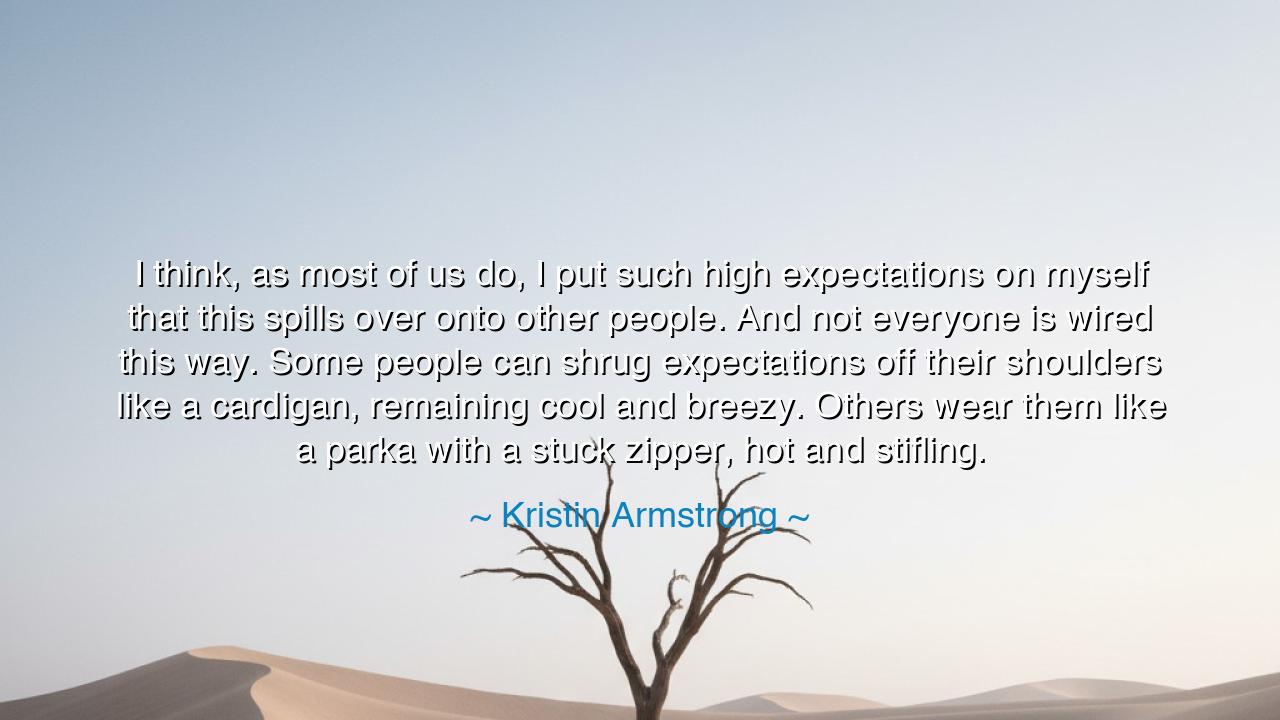
I think, as most of us do, I put such high expectations on myself
I think, as most of us do, I put such high expectations on myself that this spills over onto other people. And not everyone is wired this way. Some people can shrug expectations off their shoulders like a cardigan, remaining cool and breezy. Others wear them like a parka with a stuck zipper, hot and stifling.






"I think, as most of us do, I put such high expectations on myself that this spills over onto other people. And not everyone is wired this way. Some people can shrug expectations off their shoulders like a cardigan, remaining cool and breezy. Others wear them like a parka with a stuck zipper, hot and stifling." These words by Kristin Armstrong resonate deeply with the human experience of expectations—those invisible weights we carry that shape our perceptions of ourselves and others. In this reflection, Armstrong draws a striking contrast between individuals who can navigate the pressures of expectation with ease, and those who are burdened by them. Her words capture the essence of the struggle that many face in balancing their inner drive with the world’s often unrealistic demands.
In the ancient world, expectations were often tied to duty, honor, and virtue. The Greeks believed that individuals should strive for excellence (or arete) in all things, but there was also an understanding that virtue must be balanced with wisdom. Socrates, for example, taught that the pursuit of wisdom and virtue was not meant to be a heavy burden but a joyful undertaking. However, in the case of the Stoics, like Marcus Aurelius, there was an emphasis on accepting what we cannot control and recognizing that external pressures, including the expectations placed on us by others, should not define our inner peace. Aurelius believed that our true strength lay not in meeting every expectation but in how we respond to the challenges and pressures placed upon us. He would have understood Armstrong’s distinction between those who carry their expectations lightly and those who feel as though they are stifled by them.
Similarly, in ancient Rome, the concept of fate was intricately tied to personal duty and honor. The Romans saw life as a journey of service to the state and to others. However, there was a recognition that excessive weight placed on one's duty could cause inner conflict. A person who was burdened by expectations could lose sight of their true purpose, becoming overwhelmed by the demands of society and losing their sense of self. Cicero, in his reflections, spoke often about the need to maintain balance in one's life. He believed that to fulfill one’s duty with integrity, one had to carry it with moderation, not letting it become an oppressive force that stifled the spirit.
Armstrong’s metaphor of the cardigan and the parka beautifully illustrates the idea that expectations weigh differently on each person. Some individuals, blessed with a sense of ease, glide through life without being shackled by the demands of others. They wear their responsibilities like a light jacket, and the weight of the world seems manageable. In contrast, there are those who feel every expectation like a heavy coat that is too tight and suffocating. The stuck zipper symbolizes the difficulty of escaping from the pressure, leaving one feeling trapped by their self-imposed obligations and the demands of others. This tension between the two responses—ease versus burden—captures the struggle of modern existence, where the expectations of success, productivity, and personal growth often become forces that stifle rather than uplift.
Consider the example of Leonardo da Vinci, a man whose genius was often overshadowed by the burdens of expectation. Da Vinci was driven by an insatiable curiosity and a relentless pursuit of excellence, but his life was also marked by a series of unfinished projects. His high expectations for himself often led to self-doubt and disappointment, as the weight of perfectionism became stifling. Yet, his journey teaches us that it is not only the expectations of others that weigh on us but also the unrealistic standards we set for ourselves. Da Vinci’s struggles with the pressures of genius highlight the danger of allowing expectation to become a burden, a “parka with a stuck zipper” that prevents us from moving forward.
The lesson we learn from Armstrong’s insight, and from historical figures like Da Vinci, is one of self-awareness and balance. Expectations, both internal and external, are an inevitable part of life, but they must not become oppressive. We must learn to differentiate between those expectations that are aligned with our values and those that are merely the burdens of society’s whims. To live with peace and purpose, we must shed the excess weight of unnecessary expectations and learn to carry only that which is truly ours to bear.
In your own life, ask yourself: are your expectations weighing you down, or are they helping you grow? Are you carrying the expectations of others as though they are your own, or are you setting boundaries and defining your own path? Take a moment to reflect on the expectations you have of yourself and others. Are they aligned with your true values and purpose, or have they become a heavy burden that stifles your spirit? Let Armstrong’s words be a guide to lighten the load of your life—embrace the coolness of ease, wear the responsibilities that truly serve you, and shed the parka of unnecessary pressure. When we live in balance, we not only fulfill our true potential, but we also honor the freedom that comes with self-awareness and authenticity.






AAdministratorAdministrator
Welcome, honored guests. Please leave a comment, we will respond soon